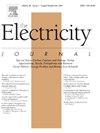Heat pumps emit more carbon than efficient fossil heating in new england because of dirty marginal power generation fuels
IF 2.2
Q1 Social Sciences
引用次数: 0
Abstract
Electrification by substituting heat pumps for fossil heating assumes carbon emissions are thereby lowered. However, detailed studies of the marginal emissions impact from a heat pump have rarely been validated against historical data. This study estimates emissions using a backcast of actuals from 2018 in New England to infer the impact of heat pump conversions. The model suggests a heat pump would have emitted 68 % more CO2 than a 90 % efficient gas furnace. But if oil and coal plants had not been activated, the model suggests heat pumps would only have emitted 3.3 % more CO2 than a gas furnace. Carbon emissions vary with the relative efficiency of the marginal electric generator and heat pump. Heat pump efficiency declines during cold weather, coinciding with peak heating load. Emissions are dominated by short periods when coal and oil generation resources operate, coinciding with low temperatures. But even with coal and oil plants on the system, a hybrid heat pump - gas furnace configuration reduces CO2 emissions 5.6 % compared to a gas furnace alone. Thus hybrid operation is preferred where fossil fuels are primarily on the margin.1
在新英格兰,由于使用肮脏的边际发电燃料,热泵比高效的化石供暖排放更多的碳
用热泵代替化石燃料供暖的电气化假设碳排放因此降低。然而,对热泵边际排放影响的详细研究很少根据历史数据进行验证。本研究使用新英格兰2018年的实际数据来估算排放量,以推断热泵转换的影响。该模型表明,热泵比效率为90% %的煤气炉排放的二氧化碳多68% %。但是,如果石油和煤电厂没有被激活,该模型表明,热泵只会比煤气炉多排放3.3% %的二氧化碳。碳排放量随边际发电机和热泵的相对效率而变化。在寒冷的天气里,热泵效率下降,与热负荷高峰相吻合。排放主要发生在煤炭和石油发电资源运行的短时间内,同时气温较低。但是,即使在系统上有煤炭和石油工厂,与单独的煤气炉相比,混合热泵-煤气炉配置减少了5.6% %的二氧化碳排放。因此,在化石燃料基本处于边缘的地方,混合操作是首选
本文章由计算机程序翻译,如有差异,请以英文原文为准。
求助全文
约1分钟内获得全文
求助全文
来源期刊

Electricity Journal
Business, Management and Accounting-Business and International Management
CiteScore
5.80
自引率
0.00%
发文量
95
审稿时长
31 days
期刊介绍:
The Electricity Journal is the leading journal in electric power policy. The journal deals primarily with fuel diversity and the energy mix needed for optimal energy market performance, and therefore covers the full spectrum of energy, from coal, nuclear, natural gas and oil, to renewable energy sources including hydro, solar, geothermal and wind power. Recently, the journal has been publishing in emerging areas including energy storage, microgrid strategies, dynamic pricing, cyber security, climate change, cap and trade, distributed generation, net metering, transmission and generation market dynamics. The Electricity Journal aims to bring together the most thoughtful and influential thinkers globally from across industry, practitioners, government, policymakers and academia. The Editorial Advisory Board is comprised of electric industry thought leaders who have served as regulators, consultants, litigators, and market advocates. Their collective experience helps ensure that the most relevant and thought-provoking issues are presented to our readers, and helps navigate the emerging shape and design of the electricity/energy industry.
 求助内容:
求助内容: 应助结果提醒方式:
应助结果提醒方式:


